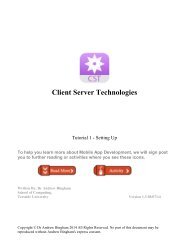15|16
You also want an ePaper? Increase the reach of your titles
YUMPU automatically turns print PDFs into web optimized ePapers that Google loves.
Presentations<br />
The confidence and skills<br />
required to give effective<br />
presentations are acquired<br />
over the whole duration of<br />
your programme. These<br />
skills are useful in many<br />
walks of life and contribute<br />
greatly to the usefulness<br />
of your degree in many<br />
areas of employment.<br />
Personal Development Planning (PDP)<br />
One of the great strengths of your programme is the<br />
way that it enables you to make sense of your learning<br />
through personal development planning. PDP sessions<br />
are embedded at every level of learning. For this you’ll<br />
keep a personal, illustrated progress file to record your<br />
goals and reflections on your progress towards them,<br />
in the context of your career aspirations and your<br />
developing knowledge of professional practice. PDP<br />
also involves regular portfolio reviews with your tutors…<br />
Portfolio Reviews<br />
At key points throughout your whole programme<br />
you’ll present and discuss examples of your work at<br />
a portfolio review. This enables you to reflect critically<br />
on your achievement across projects and modules,<br />
using the various types of feedback you have received<br />
on your work. The portfolio review also helps you to<br />
prepare for ‘portfolio surgeries’ offered to graduates by<br />
professional designers.<br />
Independent learning<br />
This is a very important part of degree level work. Your<br />
success will depend on your ability to develop the skills<br />
that will enable you to learn independently, using your<br />
own initiative and resourcefulness to achieve your<br />
goals.<br />
e@t<br />
e@t is the University’s<br />
Virtual Learning<br />
Environment, accessed<br />
through the internet:<br />
https://eat.tees.ac.uk<br />
You’ll be introduced to<br />
e@t early in your first<br />
academic year. It will<br />
be used during your<br />
programme in various<br />
ways; for example<br />
keeping you in touch<br />
with programme and<br />
module information,<br />
online discussions, wikis,<br />
blogs, useful links, online<br />
assessment and also<br />
copies of module briefs/<br />
handbooks will be held<br />
there.<br />
It is therefore important<br />
that you actively engage<br />
in the use of the e@t<br />
environment. You’ll<br />
be expected check for<br />
postings on a daily basis.



